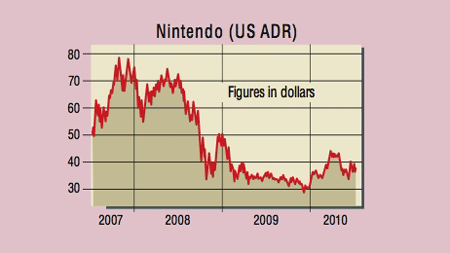The best way to get in on the rise of 3D films
In the entertainment industry, 3D technology is the hot topic, with suggestions that it could be worth more than $40bn by 2015. So how can you profit from it? Theo Casey investigates the sector, and picks the best bet to buy now.

Get the latest financial news, insights and expert analysis from our award-winning MoneyWeek team, to help you understand what really matters when it comes to your finances.
You are now subscribed
Your newsletter sign-up was successful
Want to add more newsletters?

Twice daily
MoneyWeek
Get the latest financial news, insights and expert analysis from our award-winning MoneyWeek team, to help you understand what really matters when it comes to your finances.

Four times a week
Look After My Bills
Sign up to our free money-saving newsletter, filled with the latest news and expert advice to help you find the best tips and deals for managing your bills. Start saving today!
Seven months ago, James Cameron's billion-dollar epic Avatar was unleashed on cinema-goers. The film may no longer be top of the box office charts, but 3D, the technology it breathed new life into, remains the hot topic in the entertainment sector. From the big and small screen to gaming and personal computing, all corners of the industry are trying to make 3D their own. A recent report from Merrill Lynch suggests this burgeoning market could be worth more than $40bn by 2015.
But be careful: fads for 3D have come and gone in the past. This, its latest incarnation, is still young. Consumer demand outside of the cinema remains an unknown quantity. There are three key areas for investors to watch.
Home cinema
The US Consumer Electronics Association believes two-thirds of consumers who buy a TV in the next three years will probably plump for a 3D-enabled one and electronics giant Sony (US: SNE) is one of its biggest proponents. As Sony chairman Sir Howard Stringer tells it, "3D is the next great consumer experience". Sony is launching a raft of 3D products, including Blu Ray players, PlayStation consoles, and the heavily advertised Bravia TV range.
MoneyWeek
Subscribe to MoneyWeek today and get your first six magazine issues absolutely FREE

Sign up to Money Morning
Don't miss the latest investment and personal finances news, market analysis, plus money-saving tips with our free twice-daily newsletter
Don't miss the latest investment and personal finances news, market analysis, plus money-saving tips with our free twice-daily newsletter
However, it's not a stock we're keen on. Growing competition in the gaming sector has hurt the firm, while the strengthening yen has hit exports Sony makes more than a fifth of its sales in America.
Its Korean rival Samsung (KS: 005930) may fare better. With a 34% share of the global DRAM computer-chip market, 21% of mobile telecoms, and as the world leader in digital television, this company's foray into 3D is less critical to its fortunes than is the case with Sony. And the group's diverse earnings base and solid balance sheet are also attractive. However, it's hardly a pure play on 3D, and home electronics as a whole is a highly cyclical industry not the best place to be if there's a double-dip.
The silver screen
A more promising play on 3D is Cineworld (LSE: CINE), Britain's only listed cinema operator. It operates 74 multiplexes and has already made much of the investment in the screens required to show 3D films. In 2009 admissions rose 8.9% to 49.1 million and per-ticket spending rose 7.5% to £4.71. Cineworld boss Stephen Wiener puts the success down to 3D: "The average ticket price, excluding VAT, of 3D was almost £5.90 compared to 2D [prices] of almost £4.54." A further 102 digital screens are being installed, taking Cineworld's total to 265.
Revenues have cooled recently, but Red Hot Penny Shares writer Tom Bulford puts this down to the World Cup. "Clearly the hot weather and competing attractions of the World Cup are having an impact on cinema attendance. But encouragingly, Cineworld's market share continues to rise, now hitting 24.3% of the UK market."
Gaming
Of course, cinema profits are dependent on people being willing to shell out for 3D films. They're all the rage just now, but if consumers get sick of wearing a pair of ill-fitting glasses so they can watch the odd bit of shrapnel fly out of the screen, all that investment will have been for nothing.A better bet might be the gaming sector. In terms of hours of playing time per pound spent, games are a fairly cheap form of entertainment, so are relatively resilient in recessionary times. Our favourite pick from the sector is in the box below.
The best bet in the sector
Nintendo (NYSE: NTDOY) is our pick of the ways to play 3D. That's because Nintendo has dealt with the fundamental problem with the technology it has got rid of those annoying glasses. Nintendo's 3DS console will rely on the player's perspective rather than headgear.

The new console will be released this financial year (before April). It uses the latest technology, so it won't be superseded by competitor consoles any time soon. Crucially, it also has significant third-party support from other software developers. That means there will be a full catalogue of first- and third-party games to expect when this console launches, which will broaden its appeal and increase adoption rates among gamers.
As for the wider company, Nintendo has a fortress-like balance sheet and no debt. The share trades at 14.6 times 2010 earnings and it pays a 3.6% yield that's cheap compared to its historical average p/e rating, which is closer to 20 or more. Broker upgrades and earnings outperformance are likely to drive the share price higher from this point. Nintendo shares have their primary listing in Tokyo, but British investors will find that they are most affordably purchased via American Depository Receipts (ADR).
This article was originally published in MoneyWeek magazine issue number 495 on 16 July 2010, and was available exclusively to magazine subscribers. To read more articles like this, ensure you don't miss a thing, and get instant access to all our premium content, subscribe to MoneyWeek magazine now and get your first three issues free.
Get the latest financial news, insights and expert analysis from our award-winning MoneyWeek team, to help you understand what really matters when it comes to your finances.
Theo is a former financial writer and editor, having written for reputable titles such as Euromoney Institutional Investor and Redwood Publishing. He has also appeared on-screen with Al Jazeera, BBC and CNBC and on MoneyWeek Theo covered funds, share tips and stockmarkets. He also edited the country's oldest newsletter with Lord Rees-Mogg for four years. Theo now runs his own content marketing agency for financial companies, and he is a seasoned CISI-qualified investment adviser.
-
 Can mining stocks deliver golden gains?
Can mining stocks deliver golden gains?With gold and silver prices having outperformed the stock markets last year, mining stocks can be an effective, if volatile, means of gaining exposure
-
 8 ways the ‘sandwich generation’ can protect wealth
8 ways the ‘sandwich generation’ can protect wealthPeople squeezed between caring for ageing parents and adult children or younger grandchildren – known as the ‘sandwich generation’ – are at risk of neglecting their own financial planning. Here’s how to protect yourself and your loved ones’ wealth.
